
An enthralling window into another world
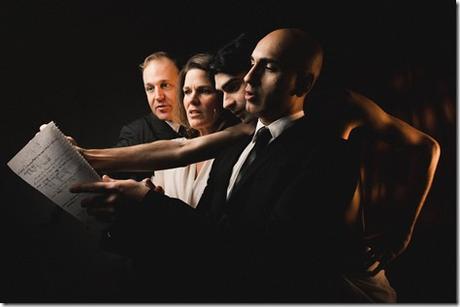
Review by Catey Sullivan
I've heard that when mathematical equations become advanced enough, they turn into poetry. That seems eminently logical, even to someone who finds basic arithmetic irksome. The music of the spheres is, after all, based on orbiting geometry, the ethereal sounds the whirling result of unimaginable arcs and angles. TimeLine's A Disappearing Number , attempts to capture the all-but unknowable beauty of higher mathematics. It succeeds somewhat. It is beautiful concept, both intellectually and visually.
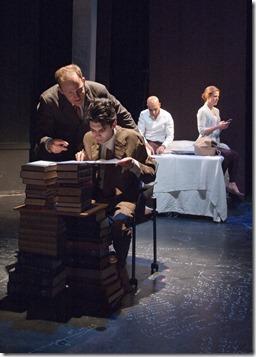
Time bends, skips and stutters in A Disappearing Number as the intertwined plotlines move between the early 20th century to the early 2000s. Linear, straightforward dialogue flows toward the surreal as the cast merges words with the fluid choreography of William Carlos Angulo. Like Angulo's stylized movement, Rasean Davonte Johnson's video projections are a constant presence, seeping the stage in environments from the horrors of World War I to a clacking 21st century train car speeding across India.
The drama starts with some meta-theatrics, as Ruth (Juliet Hart), a math professor, walks her class - and the audience - through increasingly elaborate sequences of letters, numbers and unknowns. She's perhaps five minutes in when she freezes, chalk in midair. The interruption comes from actor Anish Jethmalani, who proceeds to explain that nothing we're seeing is real. Ruth's glasses have no glass. The lights are courtesy of an artist perched in a booth above the stage, the sounds from a musician who waves down from another booth.
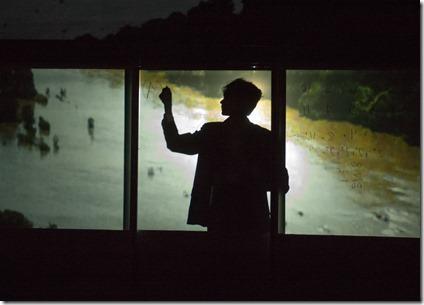
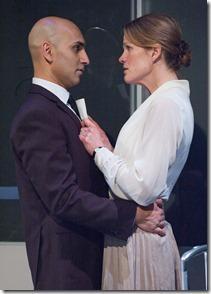
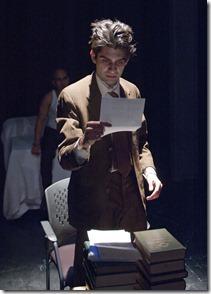

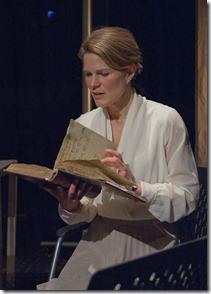
The only thing that's real - the only element that lives in both the world of the play and the world outside of it - is the math. From that beguiling opening, A Disappearing Number digs into the twined lives of Ruth, Al and a staggeringly brilliant mathematician, Srinivasa Ramanujan, born in India in 1887. Ramanujan (Siddhartha Rajan) is both a link between past and present and between the sort of personal equations that have little - at least overtly - to do with the likes of integers and cosines.
Ramanujan's startling, potentially planet-altering math discovery came to the attention of Harvard's G.H. Hardy (Dennis William Grimes) in the early 1900s - roughly a century before Al finds himself captivated by Ruth's lecture. A Disappearing Number transposes the Ramanujan's biography with Al and Ruth's courtship and marriage.
The beauty of A Disappearing Number lies in that transposition. Movement, flickering video, recordings and live action form an elegant web over the stage and through the story. Bowling pulls all the strands together with the symmetry and exquisite delicacy of a spider. His cast is up to the task, even when the story itself is lacking.
As Al, Kareem Bandealy captures the headstrong joy of a man who unexpectedly finds himself head-over-heels in love, and later, the infinite grief of someone who has lost that love. Hart's Ruth is also overflowing with joy, but it's a quieter, subtler more private expression of the emotion. As Ramanujan, Ragan brings a wraith-like, almost supernatural feel to the young genius. There's an otherworldly light to him, and that seems absolutely perfect for a character who has unlocked one of the universe's great secrets.
Still, A Disappearing Number is also frustrating. Ramanujan's discovery - which Ruth opens the play discussing - is never examined in anything remotely resembling layman's terms. That renders the play something like Agatha Christie novel where you never find out who the murderer is.
The love story between Al and Ruth is also on shaky ground, despite stellar performances by Hart and Bandealy. Complicite asks the audience to take on faith that Al falls in love with Ruth all but immediately. He goes from 0 (accidentally wandering into her lecture hall) to 500 (dedicating his life to her) without anything in between. It's a leap too far.
The shortcomings don't diminish the intrigue and complex beauty within A Disappearing Number . It's a window to another world, and one well worth gazing into.
A Disappearing Number continues through April 9th at TimeLine Theatre, 615 W. Wellington (map), with performances Wednesdays and Thursdays at 7:30pm Fridays 8pm, Saturdays 4pm & 8pm, Sundays 2pm. Tickets are $38-$46, and are available by phone (773-281-8463 x6) or online through their website (check for half-price tickets at Goldstar.com ). More information at TimeLineTheatre.com. (Running time: 1 hour 50 minutes, includes an intermission)
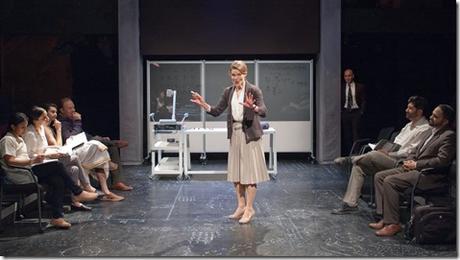
Kareem Bandealy (Al), Anu Bhatt (Young Woman, Janaki, Surita, librarian, ensemble), (Ramanujan's mother, Gertrude, Barbara, ensemble), Dennis William Grimes (Hardy, ensemble), Juliet Hart (Ruth), Anish Jethmalani (Aninda, ensemble), Siddhartha Rajan (Ramanujan, ensemble), Joseph Sultani (taxi driver, David Littlewood, Dr. Wingfield, ensemble), Bob Garrett, Ronnie Manley (musicians), Anand Bhatt, Dana Black, Suzan Faycurry, Victor Holstein (understudies)
behind the scenes
Nick Bowling (director), Maren Robinson (dramaturg), Dina Spoerl (lobby display), Eva Breneman (dialect coach), Mikhail Fiksel (sound design), William Boles (scenic designer), William Carlos Angulo (choreographer), Sally Dolembo (costume design), Rasean Davonte Johnson (projections design), Vivian Knouse (properties design), Rachel Levy (lighting design), Alex Dearmin (stage manager), Brendan Flynn (assistant director), Alka Nayyar (associate director), Luci Kersting (production assistant), (photographs), Lara Goetsch (marketing, photographs),

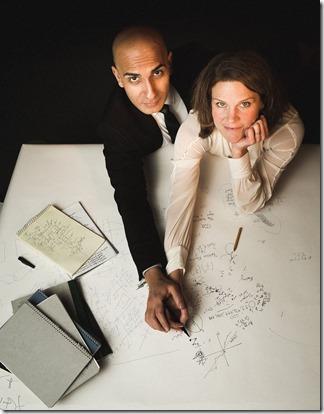
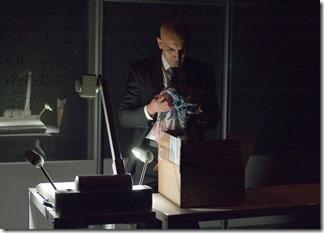
Tags: 17-0123, Alex Dearmin, Alka Nayyar, Anand Bhatt, Anish Jethmalani, Anu Bhatt, Arya Daire, Bob Garrett, Brendan Flynn, Catey Sullivan, Chicago Theater, Complicite, Dana Black, Dennis William Grimes, Dina Spoerl, Eva Breneman, Joe Mazza, Joseph Sultani, Juliet Hart, Kareem Bandealy, Lara Goetsch, Luci Kersting, Maren Robinson, Mikhail Fiksel, Nick Bowling, post, Rachel Levy, Rasean Davonte Johnson, Ronnie Manley, Sally Dolembo, Siddhartha Rajan, Simon McBurney, Suzan Faycurry, Theatre de Complicite, TimeLine Theatre, Victor Holstein, Vivian Knouse, William Boles, William Carlos Angulo

